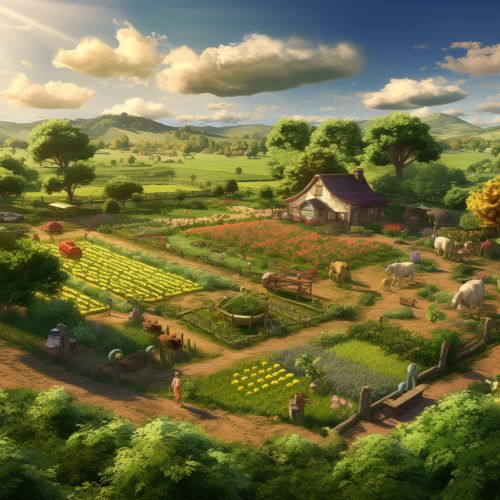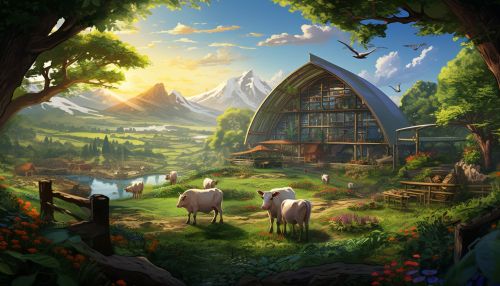Sustainable Agriculture
Introduction
Sustainable agriculture is the production of food, fiber, or other plant or animal products using farming techniques that protect the environment, public health, human communities, and animal welfare. This form of agriculture enables us to produce healthful food without compromising future generations' ability to do the same.


Principles of Sustainable Agriculture
Sustainable agriculture is grounded in the principle of meeting society's food and textile needs in the present without compromising the ability of future generations to meet their own needs. Therefore, practitioners of sustainable agriculture seek to integrate three main objectives into their work: a healthy environment, economic profitability, and social and economic equity. These goals are often referred to as the three pillars of sustainable agriculture, representing a broad commitment to environmental stewardship, farm profitability, and prosperous farming communities.
Environmental Stewardship
Environmental stewardship in sustainable agriculture involves the long-term preservation of natural resources. It emphasizes the conservation of soil, water, and air resources, as well as the enhancement of biodiversity. This can be achieved through various practices such as crop rotation, cover cropping, soil conservation, and integrated pest management.
Economic Profitability
Economic profitability is crucial for the sustainability of agriculture. Farmers must be able to earn a decent living and maintain the profitability of their farms over the long term. This can be achieved through efficient use of resources, value-added processing, direct marketing, and organic or specialty crop production.
Social and Economic Equity
Social and economic equity is another key principle of sustainable agriculture. It involves fair treatment and quality of life for farmers and farm workers, as well as the broader rural community. This can be achieved through fair trade, living wages, safe working conditions, and community-supported agriculture programs.
Practices of Sustainable Agriculture
Sustainable agriculture practices are designed to protect the environment, expand the Earth's natural resource base, and maintain and improve soil fertility. They are based on a mixture of traditional wisdom and modern scientific research, and they vary from region to region due to differences in climate, culture, and resources.
Crop Rotation
Crop rotation is a common practice in sustainable agriculture. It involves changing the type of crop grown in a particular field from year to year. This helps to prevent the buildup of pests and diseases that can occur when the same crop is continuously cultivated. It also helps to maintain soil fertility by improving its structure and nutrient content.
Cover Cropping
Cover cropping is another sustainable agriculture practice. Cover crops are plants grown to protect and enrich the soil rather than for the purpose of being harvested. They help to prevent soil erosion, improve soil structure, and increase organic matter content. They can also suppress weeds and provide habitat for beneficial insects.
Integrated Pest Management
Integrated pest management (IPM) is a pest control strategy that uses a combination of biological, cultural, physical, and chemical methods to control pests. The goal of IPM is to manage pests and the damage they cause in a way that minimizes both economic and environmental harm.
Soil Conservation
Soil conservation involves practices designed to prevent soil erosion, maintain soil fertility, and promote the health of the soil ecosystem. These practices can include contour plowing, terracing, and the use of cover crops.
Benefits of Sustainable Agriculture
Sustainable agriculture offers a number of benefits. It can help to preserve and restore critical habitats, protect endangered species, and maintain high levels of biodiversity. It can also improve the quality of water and reduce water usage and pollution. Furthermore, sustainable agriculture can enhance soil health, improve the resilience of farms, and increase farm productivity and crop diversity.
Challenges and Future Directions
Despite its many benefits, sustainable agriculture faces several challenges. These include the high costs of transition, the lack of research and development, and the lack of market incentives. However, with increasing public awareness of environmental issues and the growing demand for sustainable products, the future of sustainable agriculture looks promising.
